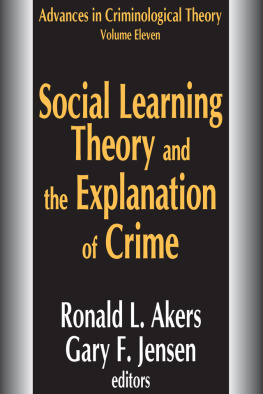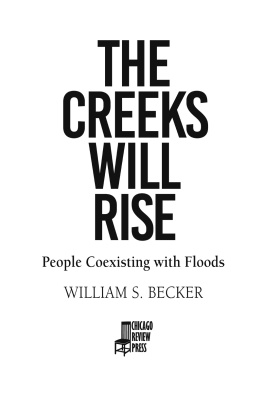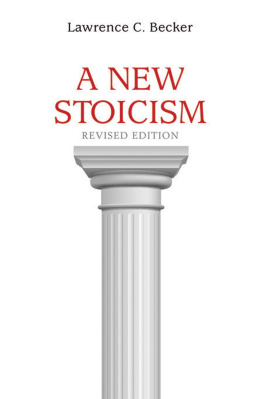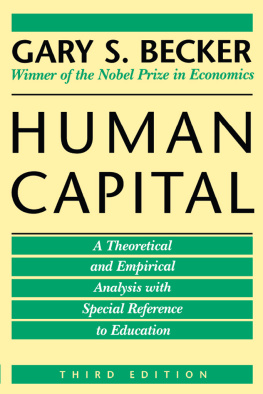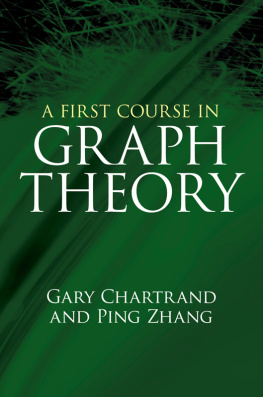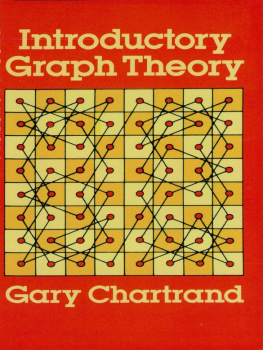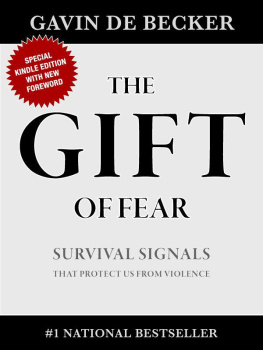Gary S. Becker - Economic Theory
Here you can read online Gary S. Becker - Economic Theory full text of the book (entire story) in english for free. Download pdf and epub, get meaning, cover and reviews about this ebook. publisher: Transaction Publishers, genre: Politics. Description of the work, (preface) as well as reviews are available. Best literature library LitArk.com created for fans of good reading and offers a wide selection of genres:
Romance novel
Science fiction
Adventure
Detective
Science
History
Home and family
Prose
Art
Politics
Computer
Non-fiction
Religion
Business
Children
Humor
Choose a favorite category and find really read worthwhile books. Enjoy immersion in the world of imagination, feel the emotions of the characters or learn something new for yourself, make an fascinating discovery.

- Book:Economic Theory
- Author:
- Publisher:Transaction Publishers
- Genre:
- Rating:5 / 5
- Favourites:Add to favourites
- Your mark:
- 100
- 1
- 2
- 3
- 4
- 5
Economic Theory: summary, description and annotation
We offer to read an annotation, description, summary or preface (depends on what the author of the book "Economic Theory" wrote himself). If you haven't found the necessary information about the book — write in the comments, we will try to find it.
Economic Theory — read online for free the complete book (whole text) full work
Below is the text of the book, divided by pages. System saving the place of the last page read, allows you to conveniently read the book "Economic Theory" online for free, without having to search again every time where you left off. Put a bookmark, and you can go to the page where you finished reading at any time.
Font size:
Interval:
Bookmark:
Economic Theory
Economic Theory
Gary S. Becker
With the assistance of
Micheal Grossman and Robert T. Michael
With a new introduction by the author

Second printing 2008
New material this edition copyright 2007 by Transaction Publishers, New Brunswick, NJ. Orginally published in 1971 by Alfred A. Knopf, Inc.
All rights reserved under International and Pan-American Copyright Conventions. No part of this book may be reproduced or transmitted in any form or by any means, electronic or mechanical, including photocopy, recording, or any information storage and retrieval system, without prior permission in writing from the publisher. All inquiries should be addressed to Transaction Publishers, RutgersThe State University, 35 Berrue Circle, Piscataway, New Jersey 08854-8042. www.transactionpub.com
This book is printed on acid-free paper that meets the American National Standard for Permanence of Paper for Printed Library Materials.
Library of Congress Catalog Number: 2006050072
ISBN: 978-0-202-30980-4
Printed in the United States of America
Library of Congress Cataloging-in-Publication Data
Becker, Gary Stanley, 1930
Economic theory / Gary S. Becker
p. cm.
Reprint, originally published: New York : Knopf, 1971.
Includes bibliographical references and index.
ISBN 978-0-202-30980-4 (alk. paper)
1. Microeconomics. I. Title.
HB171.5.B36 2007
To my girls JUDY and CATHY
Introduction to the Transaction Edition
This book is a combination of a reprint of my 1971 book, Economic Theory, and a collection of more than fifty unpublished problems from the graduate course on price theory that Kevin Murphy and I have taught at the University of Chicago. Economic Theory was essentially a written version of a year-long graduate course on price theory that I gave for many years at Columbia University. The problem book is joint work by Kevin Murphy, Ivan Werning, and myself. Ivan was an outstanding student at Chicago who helped work out the answers, and he wrote them up. He is fast becoming an important economist in his own right.
Ordinarily, in an economics book that combines systematic discussion of theoretical materials with many problems, the discussion is the foundation of the book, while the problems test understanding of the theoretical analysis, and illustrate how it can be applied to real-world issues. Only by doing many challenging problems can students really gain command of the concepts that are the essence of economics, and appreciate how these help understand issues that arise in the real world.
The emphasis in this book is somewhat different because the systematic analysis is a reprint and the problems are new. So in an important sense, the reprinted Eco nomic Theory is background material for the problems published for the first time. These problems cover four fields: (1) consumption, including household production, aggregation, and choices over time through investments in capital; (2) uncertainty that includes expected utility and the role of lotteries; (3) the role of competitive equilibrium in analyzing social interactions, crime, hedonics, economic growth, and many other questions; 4) imperfect competition, including monopoly, hold-ups in bargaining, and price controls.
Few of the problems simply ask to prove that a set of conclusions Y follows from a set of assumptions X. Instead the problems mainly require the use of economic theory to analyze issues that arise in the real world. Technical exercises are useful in learning the technical concepts that form the basis of economic theory, but an economist must know how to apply these concepts to real-world problems.
Of course, highly technical exercises may be quite difficult, but my experience is that students nowadays generally have less trouble with technique than students in the past had because students now are much better prepared in mathematics, probability theory, engineering, and other technical subjects. However, a technical background does not better prepare students to use economic concepts to understand behavior, the consequences of public policies, and natural events in the world around us, or in worlds that existed in the past. Some even argue, I am not sure they are right, that better technical training is partly at the expense of a greater study of history and the humanities that would have helped students get a better feel or intuition for economic applications.
The fact is that the vast majority of advanced undergraduates or graduate economics students, whether in the past or at present, start out with little intuition for economics. Fortunately, economic intuition, like a command of technical concepts, can be learned despite the dictionary association of the word intuition with the ability to know something without the need for reasoning. Economic intuition can be greatly improved through lectures that give many applications of economic theory and analysis. But no matter how many applications in the lectures, a working command of economic tools, a good economic intuition, requires trying to solve problems that deal with individual and market responses to changes in incomes, prices, technologies, market structure, institutions, policies, and natural events.
The problems in this book will help provide such a working command of economics. Most of the new problems are not easy, many are difficult, and trying to solve them will help improve ones working knowledge of economic theory. To assist in learning how to apply this theory to particular questions, detailed answers are provided to all but a small number of the new problems. Studying these answers, after trying to answer them before reading our answers, is an important part of the training in how to use economic concepts.
Some of the problems and answers deal with important economic questions that I believe are new, and could be converted into articles for economics journals. Examples include aggregation and household production exercises in Part 1, the approach to non-convexities and lotteries in Part 2, in Part 3 the referral exercise, the discussion of the optimal slaughtering of turkeys, the analysis of migration and social capital, and some of the common property exercises, and in Part 4 the pricing of durable goods when there is expected technological progress, the determination and effects of geographic clusters, and economic aspects of the determination of queues.
Economic Theory also contains problems at the end of each lecture. Many of these are still interesting and useful, and also test knowledge of economic concepts. These problems are on the whole easier than the new ones, but some are challenging (they are marked with an asterisk [*], including parts of some problems). These harder problems include one on social interactions (problem 8.4), on why educa tion improves health even when more educated persons spend less on medical care (10.1), on the interaction between self-protection and market insurance (13.1), on whether racial discrimination occurs under perfect competition (16.5), on whether there is over-or under-investment in new knowledge (27.2), on the effects of unions on wages (28.7), on the effects of migration between countries on wages and rental rates on capital (31.2), and on how changes in mortality rates impact consumption and savings (38.4).
As this course on price theory has evolved over time, it has preserved the emphasis on providing a useful command of economic tools and concepts, but we now use more mathematics than is found in Economic Theory. This is partly because students nowadays have better math backgrounds than my Columbia students had, and partly because economics has evolved toward a much greater use of mathematics. I was fortunate to have studied much mathematics and statistical theory as an undergraduate and graduate student, which allowed me to keep up with the transition to the greater emphasis on mathematical analysis and reasoning.
Next pageFont size:
Interval:
Bookmark:
Similar books «Economic Theory»
Look at similar books to Economic Theory. We have selected literature similar in name and meaning in the hope of providing readers with more options to find new, interesting, not yet read works.
Discussion, reviews of the book Economic Theory and just readers' own opinions. Leave your comments, write what you think about the work, its meaning or the main characters. Specify what exactly you liked and what you didn't like, and why you think so.

